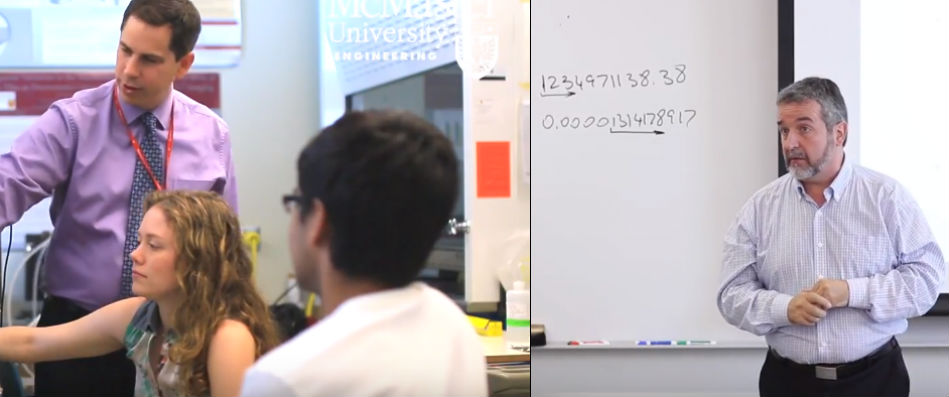Engineering professors receive university’s most prestigious teaching award

It’s a humbling experience to watch an accomplished professor overcome by the fact that he’s just been presented with one of the most prestigious teaching awards at McMaster.
“I guess I think that the work that I’ve done in the classroom and in the labs is the work that should be done. I don’t see that the work that I’ve done is particularly special – it’s just the way I like to teach,” says an emotional Greg Wohl, an Associate Professor in the Mechanical Engineering department.
Wohl along with Dan Centea, Acting Director of the School of Engineering Technology, both received the President’s Award for Outstanding Contributions to Teaching and Learning at this year’s convocation ceremony.
This award demonstrates the value the university attributes to the quality of its students’ learning experience and for faculty members, their commitment to innovating pedagogical methods and enriching the learning experience.
When asked about their approaches to teaching, Centea cites active-learning strategies as a way to inspire scholarship.
“I want to show [the students] that everything that is taught here in the course, they will be able to teach themselves [and] will be able to use at a certain time in their life…I constantly ask them to give me examples of what I am teaching so they feel that it’s relevant for them.”
Wohl also integrates “real-world examples” into the course material.
By introducing content that students “find either interesting or [that] they can relate to”, and by demonstrating “interest in the content and the application”, students are far more inclined to engage with the material.
When it comes to student engagement, both professors try to emphasize the real-world applications of the subject matter throughout their lectures.
Wohl cites his research interest in the area of biomechanics as one that particularly resonates with students.
“In a classroom of 40 students, at least a quarter of the students will put up their hand when you ask who’s injured a ligament or who’s ever sustained some kind of fracture…Biomechanics is a very broad area [as] it relates to any biological structure and the application of physics or mechanical engineering to that biological structure, including cells.”
Because biomechanics is interdisciplinary field of study, Wohl is able to bring in a host of world-class researchers from both the medical and engineering fields as guest-lecturers. This provides students with a fresh perspective on the subject-matter and also grants them with the opportunity to understand how their educational background can be applied to novel areas that they may not immediately connect with engineering.
Centea, on the other hand, encourages his students to think beyond the technical applications of a project.
“The students realize that it’s not enough to design a car. You have to sell the car and you have to think about who will use the car. Market research is an important part in which students are involved in the course.”
It’s not surprising that Centea encourages his students to consider the broader social, political, and economic implications of their work. After all, he spearheaded the problem-based learning initiative in the School of Engineering Technology, which emphasizes collaboration and self-directed study.
While Centea’s traditional research activities involve automotive engineering and hybrid electric vehicles, it is his interest in pedagogical and learning methods that drives his enthusiasm in lectures.
“I’m trying to combine the technical and the pedagogical to give students the best learning experience.”
Regardless of their diverse areas of research, two things are for certain: both Wohl and Centea demonstrate a contagious enthusiasm for the subject matter and more importantly, create an environment where students feel empowered to learn.

